

Civilization: The West and the Rest with Niall Ferguson. In New Jersey Halfway Houses, Escapees Stream Out as a Penal Business Thrives. And-from-1997-2008-things-got-grossly-unfair-all-of-the-wage-gains-went-to-the-top-10-the-wages-of-the-bottom-90-meanwhile-declined.jpg 590×413 pixels. Jeremy Rifkin: Deepening the Conversation on The Third Industrial Revolution. The Economist has devoted its April 21st issue to The Third Industrial Revolution.
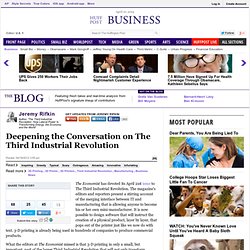
The magazine's editors and reporters present a stirring account of the merging interface between IT and manufacturing that is allowing anyone to become his or her own mini-manufacturer. It is now possible to design software that will instruct the creation of a physical product, layer by layer, that pops out of the printer just like we now do with text. 3-D printing is already being used in hundreds of companies to produce commercial products. Steven Pearlstein: The false choice between equality and efficiency. But for Ryan, fixing the economy isn’t just about eliminating the wrong incentives for the poor. It’s also about giving the right incentives to everyone else to work hard, invest and take entrepreneurial risk. So even in the face of massive budget deficits and incontrovertible evidence of rising income inequality, the Republican budget would also reduce taxes for those whose high incomes are proof not only of their superior productivity and job-creating prowess, but of their moral superiority as well.
No hammocks for them. As much as this parable of the undeserving poor and the deserving rich might offend our sense of justice, it carries a large kernel of economic truth. Economic systems that promise on equality of outcomes, whether of the communist or kibbutz variety, have repeatedly failed to deliver higher overall living standards than more market-based systems where significant gaps between rich and poor are tolerated.
Or maybe not. Reverse Racism, or How the Pot Got to Call the Kettle Black - Magazine. In America "whites once set themselves apart from blacks and claimed privileges for themselves while denying them to others," the author writes.
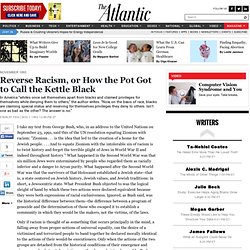
"Now, on the basis of race, blacks are claiming special status and reserving for themselves privileges they deny to others. Young, Black and Frisked by the N.Y.P.D. How Companies Learn Your Secrets. Now, you perform that series of actions every time you pull into the street without thinking very much. Your brain has chunked large parts of it. Left to its own devices, the brain will try to make almost any repeated behavior into a habit, because habits allow our minds to conserve effort. But conserving mental energy is tricky, because if our brains power down at the wrong moment, we might fail to notice something important, like a child riding her bike down the sidewalk or a speeding car coming down the street.
So we’ve devised a clever system to determine when to let a habit take over. It’s something that happens whenever a chunk of behavior starts or ends — and it helps to explain why habits are so difficult to change once they’re formed, despite our best intentions. To understand this a little more clearly, consider again the chocolate-seeking rats. Not an April Fool. There is an app, currently on the Apple app store as a free download, called Girls Around Me.
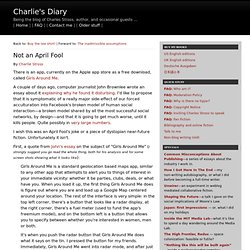
A couple of days ago, computer journalist John Brownlee wrote an essay about it explaining why he found it disturbing. I'd like to propose that it is symptomatic of a really major side-effect of our forced acculturation into Facebook's broken model of human social interaction—a broken model shared by all the most successful social networks, by design—and that it is going to get much worse, until it kills people. Quite possibly in very large numbers. I wish this was an April Fool's joke or a piece of dystopian near-future fiction. Unfortunately it isn't. What is Governance? I’m beginning a new project at Stanford/CDDRL called “The Governance Project.”
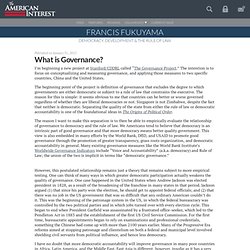
The intention is to focus on conceptualizing and measuring governance, and applying those measures to two specific countries, China and the United States. The beginning point of the project is definition of governance that excludes the degree to which governments are either democratic or subject to a rule of law that constrains the executive. The reason for this is simple: it seems obvious to me that countries can be better or worse governed regardless of whether they are liberal democracies or not. Singapore is not Zimbabwe, despite the fact that neither is democratic. The Conservative Mind - The Chronicle Review. By Corey Robin It's been a rotten few months for the nation's wealthiest 1 percent.
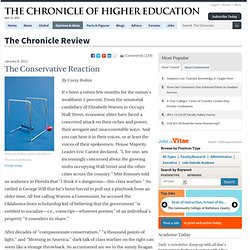
From the senatorial candidacy of Elizabeth Warren to Occupy Wall Street, economic elites have faced a concerted attack on their riches and power, their arrogant and unaccountable ways. And you can hear it in their voices, or at least the voices of their spokesmen. House Majority Leader Eric Cantor declared, "I, for one, am increasingly concerned about the growing mobs occupying Wall Street and the other cities across the country.
" Mitt Romney told an audience in Florida that "I think it's dangerous—this class warfare. " After decades of "compassionate conservatism," "a thousand points of light," and "Morning in America," dark talk of class warfare on the right can seem like a strange throwback. Since the modern era began, men and women in subordinate positions have marched against their superiors. Until 1980, for example, it was legal in every state for a husband to rape his wife. Corey Robin’s ‘Reactionary Mind’ Stirs Internet Debate. U.S. Republican Party: "It's Even Worse than It Looks": Tom Mann and Norm Ornstein at U.C. Berkeley on May 18, 2012.
Eric Schickler: Introducing our speakers today, I want to note it’s a really special pleasure to have these two individuals here because of both the role they have played in American politics and also the special connection that they have had to IGS and Berkeley over the years.
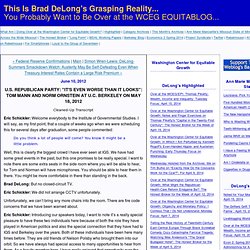
Both of these individuals have been here many times before. They are old friends of Nelson Polsby who brought them into our orbit. So we have always had special access to many opportunities to hear from them. As a faculty member here, I have really enjoyed that opportunity over the years. Tom Mann and Norman Ornstein play a special role in Washington. Tom Mann is W. Only one party’s to blame? Don’t tell the Sunday shows. - The Plum Line. Posted at 03:52 PM ET, 05/14/2012 May 14, 2012 07:52 PM EDT TheWashingtonPost Last month, Thomas Mann and Norman Ornstein published an Op ed and a book making the extremely controversial argument that both parties aren’t equally to blame for what ails Washington.
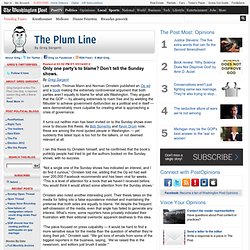
Partisan Polarization Surges in Bush, Obama Years. Trends in American Values: 1987-2012 Overview As Americans head to the polls this November, their values and basic beliefs are more polarized along partisan lines than at any point in the past 25 years.
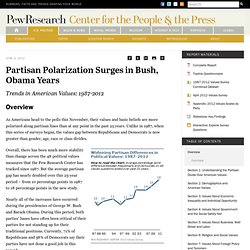
Unlike in 1987, when this series of surveys began, the values gap between Republicans and Democrats is now greater than gender, age, race or class divides. How the Rich Get Richer. Written%20Version%20of%20Effects%20of%20Fiscal%20Policy. It's the Inequality, Stupid. Want more charts like these?
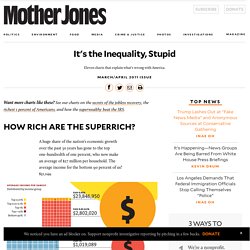
See our charts on the secrets of the jobless recovery, the richest 1 percent of Americans, and how the superwealthy beat the IRS. How Rich Are the Superrich? A huge share of the nation's economic growth over the past 30 years has gone to the top one-hundredth of one percent, who now make an average of $27 million per household. The average income for the bottom 90 percent of us? $31,244. How Much Do We Spend on the Nonworking Poor? The Republican primary field has recently decided to revive the Welfare Queen trope, perhaps in hopes that a bit of that old Reagan magic will rub off on them.
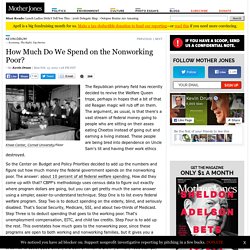
The argument, as usual, is that there's a vast stream of federal money going to people who are sitting on their asses eating Cheetos instead of going out and earning a living instead. These people are being bred into dependence on Uncle Sam's tit and having their work ethics destroyed. So the Center on Budget and Policy Priorities decided to add up the numbers and figure out how much money the federal government spends on the nonworking poor. The answer: about 10 percent of all federal welfare spending. Who Actually Benefits From Federal Benefits? Roger Ippolito, a 74-year-old Korean War veteran, receives $450 a month in social security benefits.Amanda Voisard/ZUMA Republican candidates have lately been parroting Charles Murray's argument that our "entitlement society" has created a nation of deadbeats who would rather live off government benefits than find a job.
In response, the Center on Budget and Policy Priorities (CBPP) released a study earlier this week showing the fraction of government benefits that go to able-bodied workers. Their estimate is about 9 percent. On Winner-Take-All Politics. BILL MOYERS: This week on Moyers & Company. PAUL PIERSON: I think a lot of people know that inequality has grown in the United States. But saying that inequality has grown doesn't begin to describe what's happened. JACOB HACKER: It's not the haves versus the have-nots. It's the have-it-alls versus the rest of Americans. BILL MOYERS: And… E-Mails Highlight Extent of Obama’s Deal With Industry on Health Care. On June 3, 2009, one of the lobbyists e-mailed , the president’s health care adviser. Ms. The Big Money Behind State Laws. Congressional Budget Office - Trends in the Distribution of Household Income Between 1979 and 2007. After-Tax Income Grew More for Highest-Income Households After-tax income for the highest-income households grew more than it did for any other group.
(After-tax income is income after federal taxes have been deducted and government transfers—which are payments to people through such programs as Social Security and Unemployment Insurance—have been added.) Harder for Americans to Rise From Lower Rungs. Corporate Profits Just Hit An All-Time High, Wages Just Hit An All-Time Low. Is Income Inequality Driven by Credit Booms? In his new book — which I think I have a copy of but haven't read yet — economist James Galbraith takes a deep look at income inequality and concludes that it's been rising everywhere in the world.
This suggests it's primarily been driven by macro changes in the global economy, not by specific changes in individual countries. Brad Plumer asks him what happened: The current rise in U.S. economic inequality really only gets underway starting in about 1980. What changed then? Between the end of World War II and 1980, economic growth in the United States is mostly an equalizing force, and job creation isn’t dependent on rising economic inequality. Why Unions Matter: The Numbers.
A few months ago I wrote a piece for the magazine arguing that the decline in unionization over the past three decades has been a key factor in the decline of the American left over the same period. Apple, America and a Squeezed Middle Class. Photo When joined Silicon Valley’s top luminaries for dinner in California last February, each guest was asked to come with a question for the president. Apple’s iPad and the Human Costs for Workers in China. Russia Steven Hanson. Prospect Theory.
By Evan R. Goldstein.